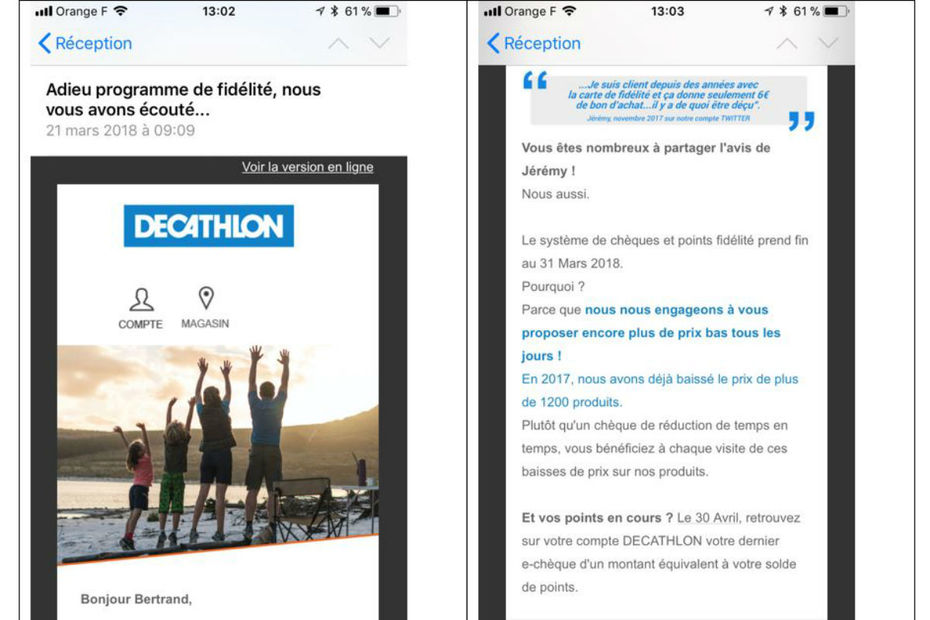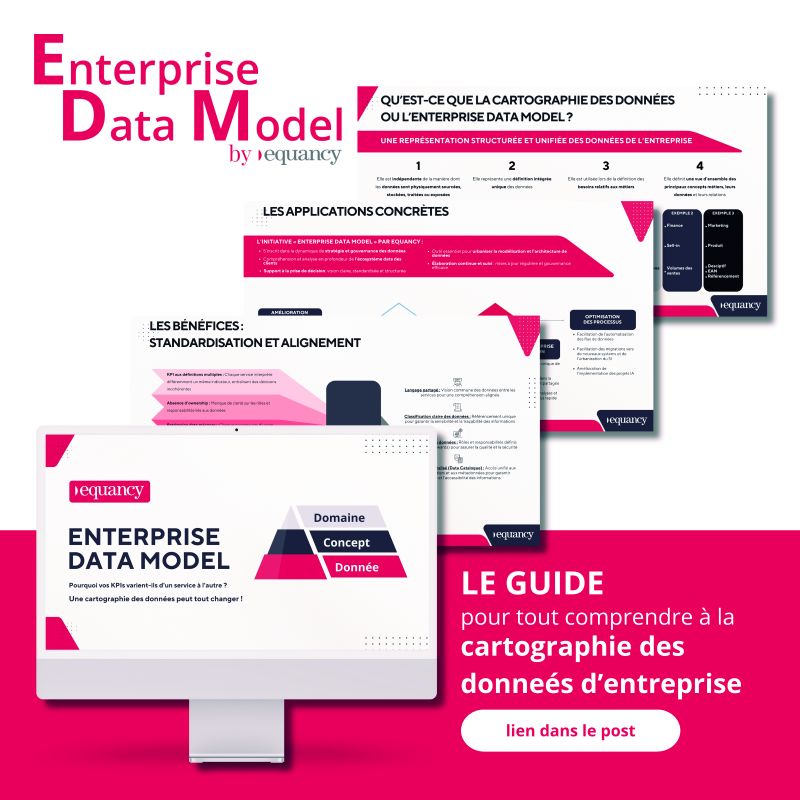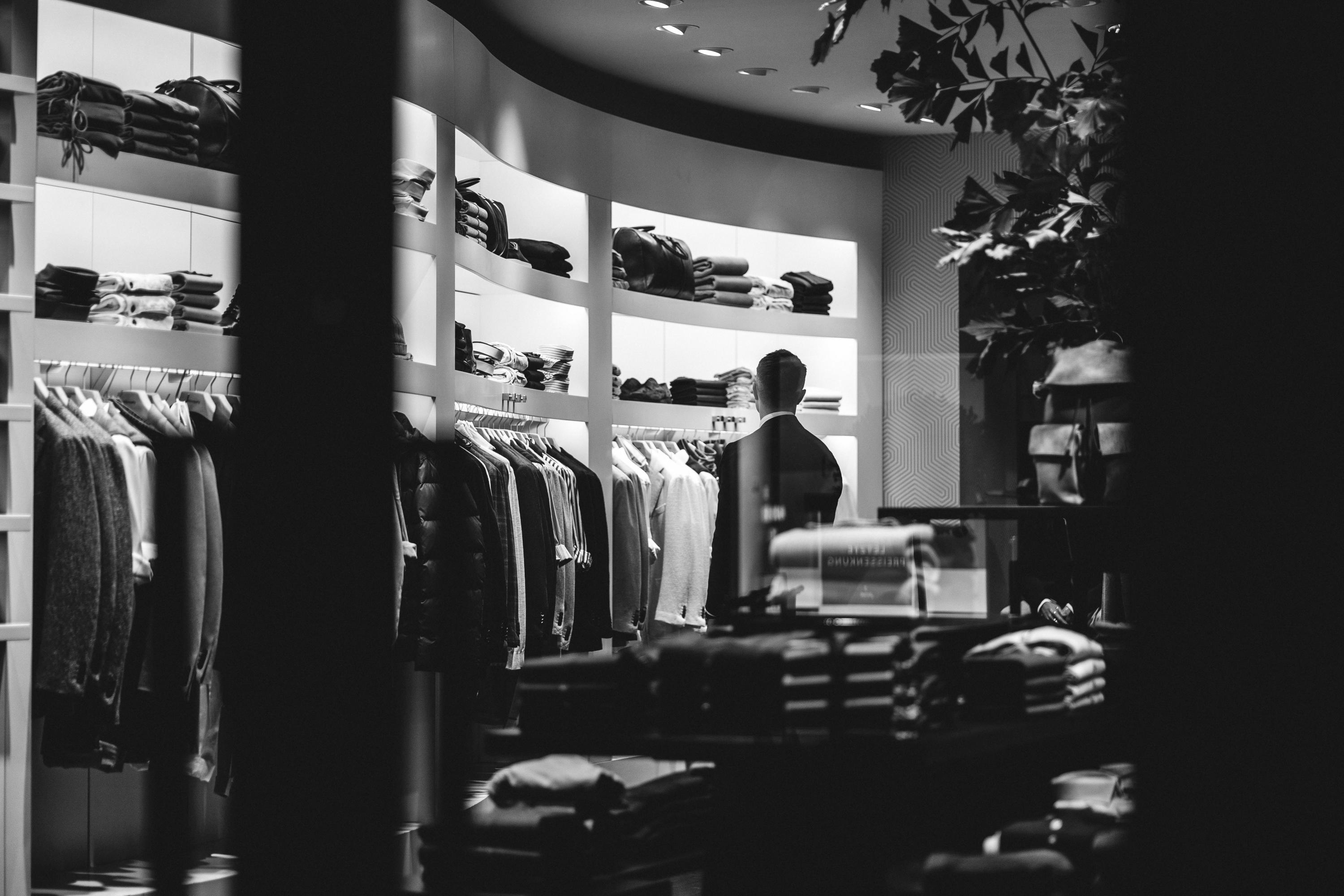Decathlon's lucidity, courage and breakthrough are to be commended. At the end of March, Decathlon sent the following email to all members of its loyalty programme:
Why Decathlon is scrapping its loyalty programme
Bertrand Destailleur, Partner in charge of customer strategies at Equancy, talks to LSA about the little-publicized abandonment of Decathlon's loyalty program. A decision of rupture synonymous with lucidity and courage for the expert in loyalty programs. And which raises questions about the future of the many other loyalty programmes of retailers.

Lucidity first
A loyalty programme cannot function sustainably on its reward mechanism alone. Relationship professionals know this. If the customer signs up for the Reward, which he does not know how generous it will be when he enters the programme, he comes back for the Recognition that the brand shows him (recognition of his status, his interests, the relevance of the content and services offered, etc.) and becomes loyal and an ambassador when he experiences a real romance with the brand (exclusive services, previews, behind-the-scenes access to the brand, co-creation of products or services, etc.). Reward, recognition, romance. It is on this triptych that a lasting and profitable relationship is built. Because the customer relationship is not a static and unchanging asset, it is a dynamic, permanently under construction, a Calder's mobile which is formed or deformed with each purchase, with each interaction, between the brand and its customer.
In the retail sector, the generosity rates of programmes vary between 1% and 3%, sometimes 4%. This explains the disappointment of Jérémy, whose tweet Décathlon takes up: "I've been a customer for years with the loyalty card and it only gives me €6 in vouchers!" With potentially 200€ spent at Décathlon (or even more), the loyal Jérémy only receives 3% discount, which is 6€. This frustrates the loyal customer who is used to the -15%, -20% promotional periods, which are by nature open to all. On the other hand, can the brand increase its generosity? Difficult, if not impossible.
Because the 3% paid out applies to all the customers who are members - the most contributors by definition - and weighs directly on the brand's turnover. Let's say Decathlon increases its generosity by 1 point from 3 to 4% (which represents a 33% increase!). This would mean a €8 discount for Jeremy. Would he be satisfied? Happy with his rewarded loyalty? Nothing is less certain.
What is certain, however, is that Decathlon would not be able to allocate the total volume of this increase to other customer loyalty levers: innovative services, timely surprises, memorable experiences, the development of exceptional relationships. Hence this email sent to all the customers who have signed up for the loyalty programme: "Goodbye loyalty programme".
Courage then
How will customers react? They have been collecting points for a year, agree to transmit their data in the hope of being rewarded, meekly present their card at each checkout and suddenly their brand tells them, "stop, it's over!" While many are asking the question, few brands are actually doing it. For fear of the trauma - Air France knows something about this, as every year it receives desperate or angry letters from its Gold customers, downgraded to Silver and no longer having access to the lounge. Fear also and above all of the "competitive disadvantage" vis-à-vis other brands. We can already imagine the recriminations of customers at the checkout at Décathlon: "At Intersport, with my card, I earn 1 loyalty point for every € spent".
And yet we can't help but salute Decathlon's courage here, because by not giving out loyalty vouchers and points to its customers, the brand is depriving itself of the key argument for tracking customer purchases: the accumulation of points. As we know, the main asset of the loyalty card is customer knowledge. And in any programme, the card only has virtue in the systematic monitoring of customer purchases and the knowledge it gathers, analyses and exploits to the greatest benefit of the company: relevance of content, personalisation of offers, adjustment of generosity, optimisation of product associations, detection of dropouts, etc.
Courage and panache then.
Because with its email, Decathlon transforms a moment of relational crisis into a moment of customer truth. What does it say just after "Goodbye loyalty programme... We have listened to you". It says it all. The brand - which, let's not forget, is committed to removing from its shelves products that receive a customer rating of less than 3 - (opportunely) uses the opinion of its customers to justify the end of its programme. Not only does it prove that it is listening, but it goes further: "Because we are committed to offering you even more low prices every day! In 2017, we have already lowered the price of over 1,200 products".
"Rather than a discount cheque every now and then, you benefit from these price cuts on our products every time you visit." Extraordinary turnaround, turning a moment of tension into an opportunity to reaffirm its commitments and its brand fight with its customers.
Breakthrough at last
Once again, Decathlon is innovating on the customer side and setting the pace. This shared announcement is a first in the retail sector. But what is the next step?
As we know, in customer marketing, the brand never stops testing and innovating. Whether in terms of content and services with video.domyos.fr which offers - free of charge - fitness classes and sessions, yoga, weight training... led by professional coaches. In terms of experiences, with the Décathlon Village, where you can test products, do sports, experience and share the Décathlon spirit. Or in terms of customer satisfaction management, by giving its checkout teams the autonomy and tools to compensate with a discount a customer who has waited too long in line before reaching the checkout.
With its "Goodbye Programme" email, Decathlon reminds us that customers are not so much loyal to loyalty programmes as to brands, to the experiences that the brand brings them, and to the exceptional relationships that the brand builds and shares with them.
Therefore, it would be dangerous, even suicidal, to think of a loyalty programme solely in terms of transactions. Customers' demands have increased and with them, the expectation of new dimensions to build loyalty: firstly, the service dimension (facilitated daily life, simplified product exchanges, courses, coaching sessions, etc.), secondly, the relational dimension (personalisation of content and products, contact with experts or the community of enthusiasts of the same sport, etc.), and thirdly, the emotional dimension (invitations to events, surprises and innovations, etc.).
This "programme exit" therefore announces a break. A break not in the renunciation of customer loyalty but in the art and manner of building loyalty. At a time when individuals have never been so connected and their opinions listened to, new loyalty levers are at work. The key to success lies in the strength and quality of the link that the brand will be able to establish with its customers (and its employees). Decathlon is well aware of this, having won the coveted title of favourite brand of the French this year. It is by establishing and maintaining exceptional relationships with its customers, by developing increasingly simple, unique, personal and enriching relationships that the brand will give itself every chance of winning the title of France's favourite brand again in 2019. To be continued...
Bertrand Destailleur
Associate Customer Experience




